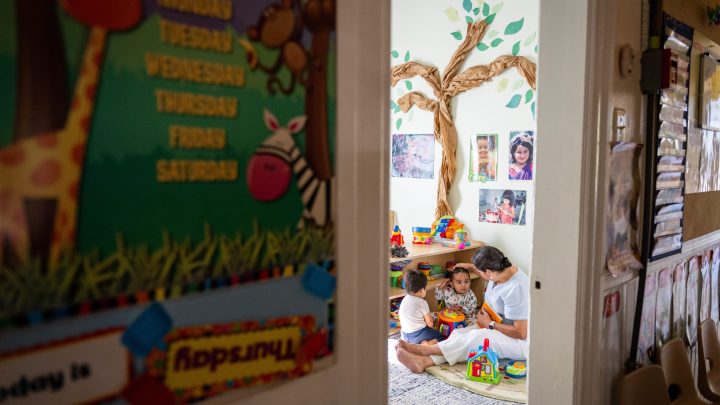
In California, child care providers unionized for better pay and retirement benefits
In California, child care providers unionized for better pay and retirement benefits

Nancy Harvey opened a daycare out of her home in Oakland nearly 20 years ago. She was excited to start a neighborhood preschool. But when she left the corporate world to do that, she wasn’t prepared for the low pay and lack of benefits.
“I had also worked in the school system, and a retirement plan was essential for anyone that worked a job. And I couldn’t understand how this very valuable industry did not have that,” Harvey said.
California is one of 11 states that allows in-home child care providers like Harvey to bargain collectively. This year, the union that represents 40,000 of these workers in that state won big in their fight for better pay and benefits.

Home-based child care providers work for themselves, and their small businesses often have slim profit margins, said Karen Schulman, a policy expert with the National Women’s Law Center.
“We always talk about how child care workers are among the lowest-paid workers. And these home-based child care workers are particularly low paid, even though they play a really crucial role,” she said.
Crucial because they offer a home setting for babies and toddlers who require more individualized care and flexible hours for parents who work night or weekend shifts. These families often qualify for subsidies from the state, which then pays the child care providers.
But for years, providers complained that the state payments were too low, so they thought, ‘Why not form a union to bargain for better pay?’
“We were organizing our union from zero,” said Patricia Moran, who runs a daycare from her home in San Jose.
She remembers organizing while kids were napping. And when it came time to negotiate a contract, Moran says bargaining would sometimes go late.

“I remember I slept like two hours, because in my daycare some parents are bringing children at 5 o’clock in the morning,” she said. “I need to be ready.”
These talks coincided with the start of the pandemic. As essential workers, many home-based providers kept their doors open but still struggled to pay their bills. They said they were seeing lower revenues due to enrollment declines and higher costs due to inflation.
California State Sen. Nancy Skinner, who leads the Legislative Women’s Caucus, said the state had to step up its investments because many daycares permanently closed.
“So we just saw this collapse that affected not only families, obviously, and the little kids that really deserve good child care, but also affected California’s employers and our economy,” Skinner said.
Harvey said the pandemic was a turning point for a workforce made up of mostly immigrants and women of color — two groups whose domestic work has historically been undervalued and excluded from labor protection laws.
“People really recognized the fact that this industry is important. We have set them aside long enough and we can’t do that,” she said.
Now, union members have state-funded healthcare, training, retirement benefits and more pay.
Harvey said having the chance to actually retire is a big change; many child care providers used to work into their final days.
“I know of several personal stories in which providers literally took care of a child the night before they passed away,” she said.
At 61 years old, she now sees a pathway where she herself can retire — and retire in dignity.

There’s a lot happening in the world. Through it all, Marketplace is here for you.
You rely on Marketplace to break down the world’s events and tell you how it affects you in a fact-based, approachable way. We rely on your financial support to keep making that possible.
Your donation today powers the independent journalism that you rely on. For just $5/month, you can help sustain Marketplace so we can keep reporting on the things that matter to you.











